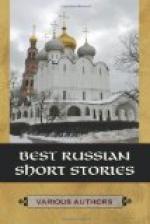But in that hour the first stirrings of regret were still uncertain and confused. The citizens found more fault with Socrates than ever because he had not given them the satisfaction of fleeing to Thessaly; they were annoyed with his pupils because in the last days they had walked about in sombre mourning attire, a living reproach to the Athenians; they were vexed with the judges because they had not had the sense and the courage to resist the blind rage of the excited people; they bore even the gods resentment.
“To you, ye gods, have we brought this sacrifice,” spoke many. “Rejoice, ye unsatiable!”
“I know not which of us chooses the better lot!”
Those words of Socrates came back to their memory, those his last words to the judges and to the people gathered in the court. Now he lay in the prison quiet and motionless under his cloak, while over the city hovered mourning, horror, and shame.
Again he became the tormentor of the city, he who was himself no longer accessible to torment. The gadfly had been killed, but it stung the people more sharply than ever—sleep not, sleep not this night, O men of Athens! Sleep not! You have committed an injustice, a cruel injustice, which can never be erased!
II
During those sad days Xenophon, the general, a pupil of Socrates, was marching with his Ten Thousand in a distant land, amid dangers, seeking a way of return to his beloved fatherland.
AEschines, Crito, Critobulus, Phaedo, and Apollodorus were now occupied with the preparations for the modest funeral.
Plato was burning his lamp and bending over a parchment; the best disciple of the philosopher was busy inscribing the deeds, words, and teachings that marked the end of the sage’s life. A thought is never lost, and the truth discovered by a great intellect illumines the way for future generations like a torch in the dark.
There was one other disciple of Socrates. Not long before, the impetuous Ctesippus had been one of the most frivolous and pleasure-seeking of the Athenian youths. He had set up beauty as his sole god, and had bowed before Clinias as its highest exemplar. But since he had become acquainted with Socrates, all desire for pleasure and all light-mindedness had gone from him. He looked on indifferently while others took his place with Clinias. The grace of thought and the harmony of spirit that he found in Socrates seemed a hundred times more attractive than the graceful form and the harmonious features of Clinias. With all the intensity of his stormy temperament he hung on the man who had disturbed the serenity of his virginal soul, which for the first time opened to doubts as the bud of a young oak opens to the fresh winds of spring.
Now that the master was dead, he could find peace neither at his own hearth nor in the oppressive stillness of the streets nor among his friends and fellow-disciples. The gods of hearth and home and the gods of the people inspired him with repugnance.




